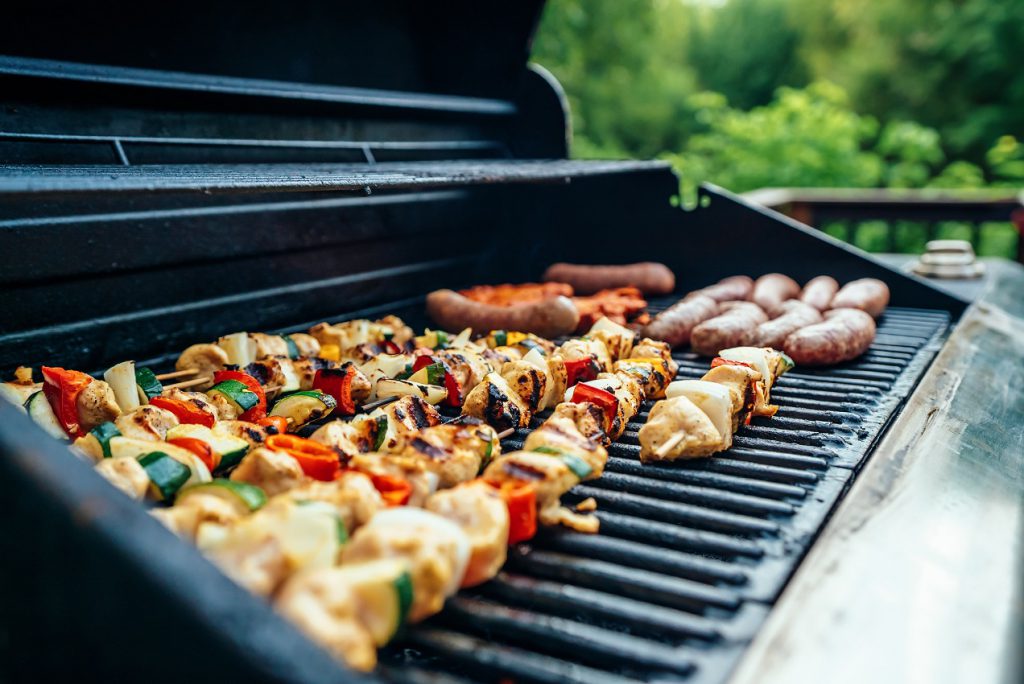
Whether at the park or in the yard, grilling is a great way to enjoy the warmer weather while preparing a hot meal without heating up one’s home. Remembering a few tips will ensure that everyone can safely enjoy deliciously grilled cuisine.
Have something to add? Add your grilling tips in the comments section below.
Tips for grilling meat
No squishing – Squishing meat will squeeze out the taste and moisture.
Consider a meat thermometer – It can be hard to tell meat’s temperature merely by touching it. Confidence in grilling will skyrocket with this one purchase.
Rest all meat – Allow the meat to sit undisturbed (and unsliced) for five to 15 minutes after cooking, as this will allow the juices to redistribute.
Tips for grilling vegetables
Oil the vegetables lightly – Vegetables dry out when they hit the heat without a little oil. Before putting the veggies on the grill, toss them with a light coating of oil. Don’t use too much-it not only adds unnecessary calories but dripping oil causes flare-ups and greasy flavors. Plus, tossing them in oil helps seasoning stick more uniformly.
Know proper cooking times – Some vegetables take a minute or two to cook while others take longer. Denser vegetables, such as potatoes, will take the longest to cook. Keeping them over too-high heat for too long will char them on the outside while keeping them raw on the inside. To prevent burning, sear vegetables over high heat, then move them to a cooler part of the grill to finish cooking.
Use skewers or a grill basket for smaller items – Cherry tomatoes, zucchini rounds, and mushrooms are great on the grill, but they’re a little unwieldy. To keep smaller vegetables from rolling around or falling though the grate, pierce them on a skewer or use a grill basket. If a grill basket is not available, fold a 24-inch-long piece of heavy-duty foil in half and crimp up the edges to create a lip; this “basket” will prevent the food from falling through while they still get plenty of smokey flavor.
Tips for grilling fruit
Set the grill temperature for between 350 – 450 F – Fruit grills best on a pre-heated surface.
Consider a coat – Some fruits prefer to be oiled while others prefer a light coating of granulated sugar. If grilling fruit for a savory recipe such as fruit salsa, oiling the fruit is the way to go. Dusting the cut side of citrus fruits like oranges, lemons, limes, and grapefruit with granulated sugar before putting them on a hot, oiled grill keeps the rinds from sticking and gives the surface of the fruit a gorgeous, caramelized finish. Some people prefer not to oil or coat their fruit at all.
Grill fruit for 6-8 minutes, flipping once – Let the fruit sit on the hot grill for a few minutes before checking for grill marks; the surface of the fruit needs time to sear so it will not stick.
Tips for grilling anything
Start with a clean grill – Do not let last night’s salmon skin impart a fishy-char flavor to tonight’s chicken breasts. Use a sturdy metal brush to clean the grates in between uses.
Let it cook – In general, the fewer times the food is flipped, the better (once is ideal for most items). If the item is stuck to the grill, let it cook more — it will unstick itself when it is ready for flipping.
Only use grills outside and away from buildings – Grills that are placed too close to the house or other combustible items can heat up adjacent materials and cause a fire to start. Be sure to keep your grill at least 10 feet from your home or other structures.
Make sure the grill is on a flat, level surface – Grills that are placed on slopes or other uneven surfaces can tip over easily and cause a fire.
Wear appropriate clothing – Articles of clothing that have long sleeves or pieces that dangle can catch fire easily when too close to an open flame. When grilling food, wear clothing that will not interfere with the cooking process and make sure that any apron strings are tied back away from your front. If a piece of clothing does catch fire, remember to stop, drop, and roll to extinguish the flames quickly.
Keep a spray bottle nearby – Keep a spray bottle filled with water beside your grill so that you can quickly extinguish smaller flames before they spread.
Always clean the grill after every use – Barbecuing regularly causes grease to build-up on the grill plates and collect inside the grease tray. If not cleaned, the build-up can then act as fuel and catch fire while the grill is in use. Clean a charcoal or gas grill after each use with a grill brush and empty the grease tray when it begins to fill up.
